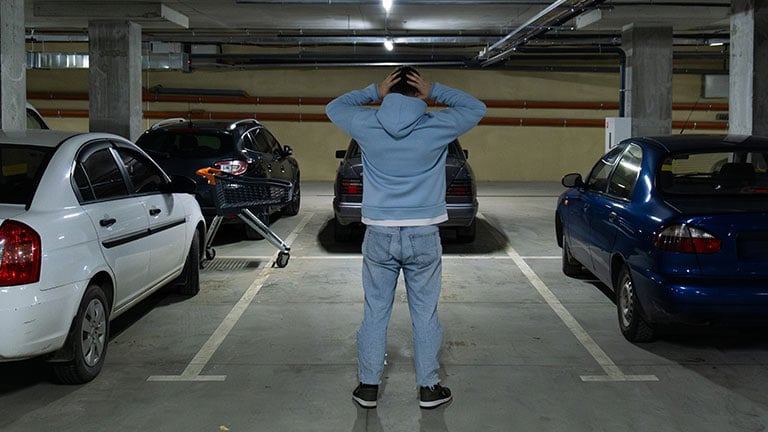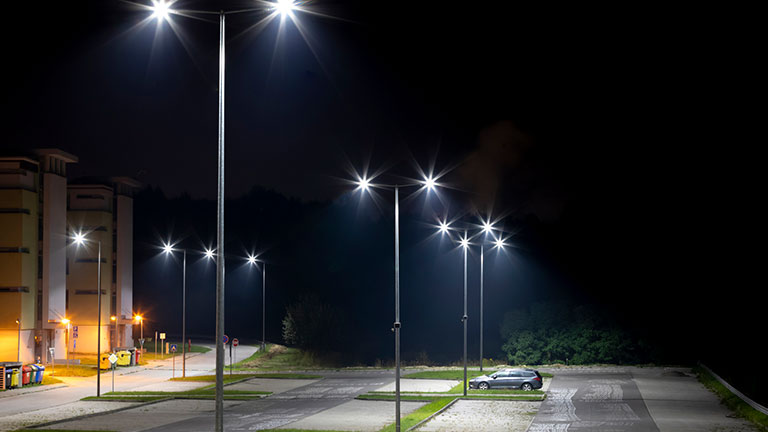Will Your Insurance Really Cover a Stolen Car? Here’s What You Need to Know
A stolen car can happen to anyone, anywhere. Make sure your auto insurance will cover it, and follow these tips to prevent vehicle theft in the first place


Discovering that your vehicle has been stolen can be both stressful and costly. Once you’ve reported the theft to the police and your auto insurance company, one of the first questions you’ll likely have is whether or not your auto insurance policy will cover the theft.
The answer depends on the type of coverage you have. Read on to learn more about your insurance policy’s role in theft protection, the steps to take if your vehicle is stolen, and tips for preventing vehicle theft.

What type of auto insurance may cover a stolen vehicle?
Comprehensive coverage is a type of auto insurance that helps protect you against non-collision-related incidents, including natural disasters, damage from an animal, vandalism, and theft.
If your vehicle is stolen and you have comprehensive coverage, your insurance provider will typically reimburse you for the actual cash value (ACV) of the vehicle, minus your deductible. ACV is the fair market value at the time of the loss, factoring in depreciation, age, mileage, and overall vehicle condition.
It’s important to note that liability insurance, which is the minimum coverage required in most states, does not protect against vehicle theft.
Collision insurance, which is often required if your vehicle is financed or leased, also does not cover theft. It is designed to help pay for damage to your vehicle resulting from a traffic accident, regardless of fault.

Potential exclusions and limitations
Even with comprehensive coverage, there are a few scenarios where your claim may be denied, or the payout will be reduced. This could include some of the following scenarios:
- If you delay reporting the theft. Failure to notify the policy and your insurance company promptly may lead to denial—or at the very least, delay—of your claim.
- If you provide incomplete documentation. Failing to provide necessary paperwork, such as a policy report or proof of ownership, can result in claim denial.
- If unauthorized drivers were using the vehicle at the time of theft. If someone not listed on your policy was driving when the vehicle was stolen and you hadn’t given them permission to use the vehicle, your coverage may be limited or denied.
- If your policy is lapsed. If your policy wasn’t active when the theft occurred, you’re not covered.
- If you’re using the vehicle outside your policy’s terms. If you’re using the vehicle for commercial purposes, such as ride-sharing or delivery, without proper coverage when it’s stolen, it could invalidate a claim.
- If the keys were left in the vehicle. Some insurers may deny claims if it’s determined the theft happened due to negligence, such as leaving your keys inside the vehicle or leaving the vehicle unlocked.
- If your vehicle has unapproved modifications. If your vehicle included custom modifications or aftermarket parts that weren’t specifically included in your policy, those may not be covered.
- If the claim filed is fraudulent. If you provide false information during the claims process, such as exaggerating the value of stolen items inside the vehicle, the claim can be denied.
Make sure to review your policy details or talk with your insurance agent to understand exactly what is and isn’t covered.
What to do if your car is stolen
If your car is stolen, it’s important to take steps quickly in order to try to recover your vehicle sooner and get help from your car insurance faster.
- File a police report. Contact your local law enforcement immediately. You’ll likely need to provide the vehicle identification number (VIN), make and model of the vehicle, license plate number, and any identifying features. You may also want to include a list of valuable items that were in the vehicle at the time of the theft. This police report is essential for your insurance claim.
- Notify your insurance company. Call your insurance company (or insurance agent directly) as soon as possible to start the claims process. Your agent will likely ask for a copy of the police report and additional documentation, such as your vehicle title or loan information.
- Wait for the vehicle to be recovered. Many insurers have a waiting period (typically seven to 30 days) before finalizing a payout, in the event the car is recovered. If the vehicle is found, your insurance may cover repairs for any damage that happened as a result of the theft. Your insurance agent will help guide you through the process of documenting the damage and arranging for repairs and reimbursement.
- Receive a settlement. If the stolen car is not found, your insurer will offer a settlement based on the ACV. This value will reflect depreciation and market conditions—not what you paid for the car or what it would cost to replace it with a new model.

How to make sure you have enough auto insurance coverage
Whether you’re worried about being the victim of a stolen car or simply want to ensure you have sufficient coverage, review your current auto insurance policy, and confirm that you have comprehensive coverage. If not, consider adding it—especially if your car is relatively new or holds significant value.
Talk to your insurance agent about where you may have gaps in coverage and what other types of coverage you may need or want.
How to prevent vehicle theft
While insurance can help with the financial loss, it’s always better to try to prevent theft in the first place. Here’s how:
- Always lock your vehicle and close all windows when parked.
- Park in well-lit, busy areas or in a secure garage when possible.
- Use anti-theft devices, such as steering wheel locks, alarm systems, or GPS trackers.
- Keep valuables out of sight, or remove them from the vehicle entirely to avoid attracting thieves.
- Don’t leave your keys inside, even for a short time.
While auto insurance can soften the financial blow of dealing with a stolen car, prevention and preparation go hand in hand. Consider comprehensive coverage, understand the claims process before you need it, and take steps to deter thieves. A trusted AAA insurance agent can help you spot coverage gaps, explore your options, and guide you through the chaos of an auto theft with clarity and confidence. A little foresight now can save a lot of frustration later.
